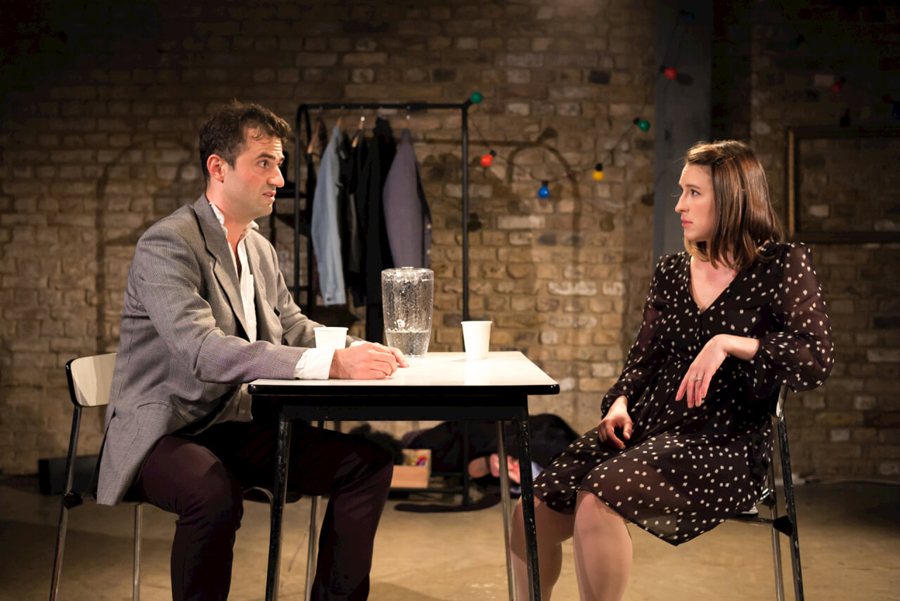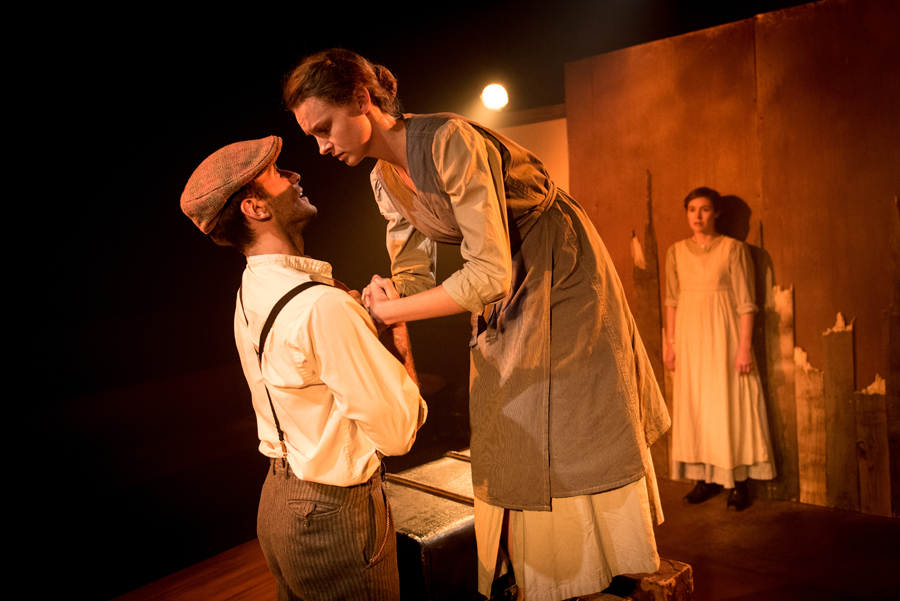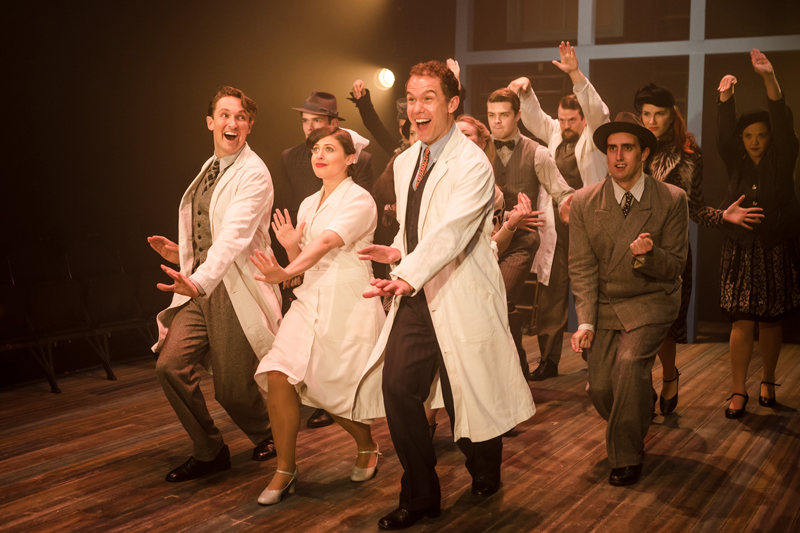 There's nothing like an anniversary to resonate with a production of a play. The conjunction of the 500th anniversary of the establishing of the Venice Ghetto and the 400th anniversary of Shakespeare's death have provided an irresistible opportunity to stage The Merchant of Venice in the ghetto itself for the very first time.
There's nothing like an anniversary to resonate with a production of a play. The conjunction of the 500th anniversary of the establishing of the Venice Ghetto and the 400th anniversary of Shakespeare's death have provided an irresistible opportunity to stage The Merchant of Venice in the ghetto itself for the very first time.
An ambitious and bold production of what is arguably Shakespeare's most controversial play by the joint forces of the Compagnia de' Colombari and Ca' Foscari University of Venice brings together an international cast performing in several languages and styles in the heart of the Jewish ghetto, lending a symbolism and interpretation impossible elsewhere.
While it's doubtful that Shakespeare ever encountered an actual Jew or had that much, if any, knowledge of the ghetto (he never mentions the word) and writes largely stock English characters and their perception of "aliens", the play explores the innate prejudices and bias of all of us and our behaviour when faced with the 'other', and so remains as relevant as ever in today's world. The play is not just about antisemitism but about ethnic and religious differences, conflict between parent and child and the fickleness of love.
The playing space is three sides of the Square at the heart of the Ghetto Nuovo, with a backdrop of vertiginously high buildings that any art director could only dream of. When Jessica throws down Shylock's money and jewels to the waiting Lorenzo, she literally throws them out of a first floor window. Set and lighting designer Peter Ksander merges nature (gradually adding lighting as night falls) and architecture with the touches needed to enhance both atmosphere and action. His vision is enhanced and complemented by costume designer Stefano Nicolao's monochromes, creams and whites, loose trousers with flowing robes, organza sleeves and overskirts – all slashed with the scarlet of Venice for the pomp of the court scene. Andrea Santini’s sound also gets help from nature, with a chorus of stage-struck cicadas.
The Venetian theme is realised wonderfully from the opening by Francesca Sarah Toich. Playing the servant Lancillotto (aka Lancelot Gobbo), Toich does so as an androgynous Arlecchino figure in Commedia dell'arte style, complete with an extraordinary deep-voiced interpretation of a comic speech about love in old Venetian dialect, which is joyously picked up by the rest of the cast as a jaunty carnivalesque song.

The song has been created and arranged for the cast and glorious small band by composer Frank London, who also provides the rest of the music that beautifully underscores the action. London draws on Judaeo-Ladino and Italian traditions, lending that carnival atmosphere to Lancillotto's antics and a heady romance to the air of Belmont as required. In their black organza robes, which contrast attractively with the creams worn by the actors, the band look as good as they sound, particularly London himself, in arresting headgear, and the twin violinists Nikole and Alexandre Stoica.
Members of the cast slip easily in and out of Italian, localising the play ever more. And since English is not the first language of many of the cast, it is good to hear them speaking Italian from the present as well as the past, alongside Shakespeare's English, spoken here by actors from numerous countries and backgrounds, and so often sounding unfamiliar to those of us brought up on productions made and performed in Britain.
Director Karin Coonrod and her team made a conscious decision not to run a straightforward version of the play but to show how we all have a Shylock within by casting the role of Shylock to five different actors, making a statement about how complex and confusing he is; how hard it is to really know him.
The five different styles of the actors playing Shylock make the audience create their own multiple personality of the character, helped by the use of Yiddish, Judaeo-Venetian, Ladino and English, emphasising the multiplicity of Jewish experience, as well as the Jewish complexity of the Venice Ghetto. Each successive Shylock must don a yellow sash, Nicolao's choice for the badge to identify the wearer as Jewish, which of course immediately recalls badges imposed on Jews from the circles of Medieval Europe to the stars of Nazi Europe. These are especially powerful ritual moments as one Shylock succeeds the other, 'ministered to' by silent figures dressed in black and dubbed "black angels".
There is another striking image of all five Shylocks sharing the space around the trees at the heart of the stage (and therefore the ghetto); a company of Jewish ghosts almost offering each other support, just as Jessica steals her fathers’ treasure – and is stolen away herself – among a crowd of loud, crude, laughing revellers. For otherwise, each Shylock is as isolated as we might imagine the Jews to be in the ghetto. Although the Ghetto 500 exhibition charting its history argues powerfully that there was plenty of two-way traffic, despite the enforced closure and confinement of its Jews between midnight and 6am.

In fact, a feature of the production is the uneasy isolation of all the players in this problem 'comedy'. There's a clear directorial decision to play the scenes wide and out to the audience, which knowingly limits the intimacy between the characters, especially Shylock and Jessica and the various pairs of lovers.
Of the five Shylocks, one is played by a woman, Jenni Lea-Jones. She pointed out to us on JR OutLoud that because his wife Leah has died, Shylock has had to be both mother and father to Jessica. In a way it’s perhaps a pity then that Lea-Jones is not the Shylock who gets to share the one brief scene Shakespeare gives him with his daughter. But she does articulate all the fury and clarity of Shylock’s impassioned claim for consideration as an equal: "Hath not a Jew eyes?" Perhaps it is here the impassioned claim of a woman, too.
The first of the other four Shylocks is Bombay-born Sorab Wadia (who doubles as arch Jew-hater and baiter Gratiano). He gets to lend 3,000 ducats to Antonio and suggest the "merry bond" of the pound of flesh, giving as good as he gets with a sturdy fearlessness in the face of the shocking antisemitism of the Christians he must deal with. The last is American actor Ned Eisenberg, playing the trial scene with such an implacable stillness that you can see he will not be moved, and why, until he is forced to break by what seems like a shocking reversal (see the verdict of the mock appeal below).
The other two Shylocks are Italian Adriano Iurissevich, who gets to relate to Jessica as a rather older father (he also makes a splendid older suitor for Portia as a Spanish guitar-playing Duke of Aragon); and a second Italian actor Andrea Brugnera, who gets to play the wronged father, his fury awoken by his errant daughter’s flight with his treasure (as reported to him by fellow Jew Tubal, again played by Eisenberg), including that turquoise ring with its emotional significance and what surely tips him into the implacable revenge-seeker of the court scene.
It’s worth remembering, as already mentioned, that it's as much rejection of the other as the Jew that Shakespeare explores here, for Portia, who expounds on the quality of mercy, is merciless in sending up and rejecting the 'other' lovers who seek her hand, above all the Prince of Morocco (a dignified and sympathetic Matthieu Pastore), who fears rightly that his "complexion" will count against him.

As for the various pairs of lovers, they seldom touch one another, much less embrace. All Linda Powell's intelligent Portia gets from her Bassanio (Michele Athos Guidi) once he has chosen the casket that delivers her as his bride, is a kiss, albeit a lingering one. The closest contact between anyone is, ironically and shockingly, between Antonio (Stefano Scherini) and Shylock, as Antonio "prepares his bosom for the knife".
And I have seldom seen the love of Jessica and Lorenzo nipped in the bud quite so quickly and cruelly. By the time they return from the 'honeymoon' spending spree on which she gives her dead mother's betrothal ring in exchange for a pet monkey, Lorenzo is already treating her like a serving maid, shoving the heavy case of jewels into her arms to carry without a backward look as she trails uneasily behind him. And by the time they reach the beautiful ornate poetry of their moonlit love scene in Belmont, things are so uneasy between them that Lorenzo's plea of "sit Jessica" becomes a command she obeys by sitting on a fountain several metres away. Paul Spera is not afraid to play Lorenzo as a cool calculating young man, obviously in it for the money. His concupiscent smirk when he learns he has 'inherited' half of Shylock's wealth is so transparently chilling that it can only confirm to Jessica that she has made a fatal mistake. Watching the light go out of Michelle Uranowitz's vulnerable, affection-starved Jessica is almost heart breaking.
Howard Jacobson avers that he usually leaves the play at the end of act four when Shylock leaves the action, and the end of the play here is a little rushed. Nonetheless, although the audience might allow itself some much-needed laughter and apparent light relief at the fun Portia and Nerissa have at the expense of their new husbands, who, failing to recognise them attired as barrister and clerk, have given away to them their betrothal rings (especially designed by Giampaolo Babetto, so not to be parted with lightly), it is far from clear what the future holds for Portia, Bassanio and Antonio, trapped in a strange love triangle, and for the apprehensive Jessica.
Yet as the five Shylocks emerge from the assembled company, asking each other and the audience, "Are you answered?" and the word "mercy" is projected on the tenement blocks of the ghetto square in the languages of the play, including the Yiddish, Rachmones, the contradictions of years of ghetto life help to illuminate this darkest of Shakespeare's comedies.

The Mock Appeal (in the matter of Shylock v Antonio)
Here at Jewish Renaissance, we’ve been working up quite a head of steam about Venice Ghetto 500, The Merchant in Venice, and the Mock Appeal on behalf of Shylock, heard before a jury of Judges presided over by The Honourable Ruth Bader Ginsburg, associate justice of the Supreme Court of the United States.
Before the performance of The Merchant in Venice on Wednesday 27 July, an expectant audience – including the great and good of Venice and further afield – gathered in the stunning surroundings of the Scuola Grande di San Rocco in the centre of Venice, taking in the rich, dark Biblical scenes with which Tintoretto adorned the high ceilings, and to marvel at the gilded pillars and pediments, wooden reliefs on the benches and the shining red and cream marble floors.
Everyone stood as the judges and advocates processed in, dignified in their dark robes set off with golden tassels. American actor F Murray Abraham, a famous Shylock in America, gave some of his most famous lines, with Judge Ginsberg supplying Portia’s lines. Then three advocates in turn – first for Shylock, then for Antonio and the Republic of Venice and finally for Portia – had 20 minutes each to make their cases. Or rather be put through their paces by Judge Ginsburg, for the razor-sharp mind of the octogenarian justice was more than a match for the three advocates, each of whom found himself pulled up by her incisive questions.
As Ginsberg appeared to floor Avvocato Manfredi Burgio, representing Shylock, I feared that his fate would be as bad, or worse, than in that first court scene in Shakespeare’s play. But as she put Avvocato Mario Siragusa, representing Antonio and the Republic of Venice, and New York’s Jonathan Gaballe, representing Portia, through a similar ordeal, I thought the scales might tip in his favour after all. When the distinguished jury went out to consider its verdict, two extraordinary Shakespeare scholars (and both Jewish), Stephen Greenblatt and James Shapiro, took to the podium to share their thoughts on the play. They assured that even if the judges took eight hours to deliberate they could keep going. They spoke so brilliantly that I rather wished they had been obliged to go on all night.
But the jury did return and the singular and exciting news is that they ruled in favour of Shylock. Since Portia was not a trained lawyer and appeared under false pretences; and since they deemed it a miscarriage of justice that Shylock should find himself accused, found guilty and sentenced in the court at which he had come to appear as plaintiff; and since it was unconstitutional, to say the least, for Antonio, the former accused, to suggest Shylock’s punishment of confiscation of half his goods in favour of Lorenzo, with whom his daughter has eloped, and conversion to Christianity on pain of death, those punishments should be revoked. And what of Portia? She was found guilty of fraud and bigotry and sentenced to three years at law school.
Happily both the production and the mock appeal have been carefully filmed and will be available online as part of the Shylock Project, thanks to the organisers of Venice Ghetto 500, under the extraordinarily resourceful and imaginative leadership of Shaul Bassi, associate professor of English Literature at Ca’ Foscari University. Full details of how, where and when these resources will be available online will be posted here on the JR Blog.
By Judi Herman
Photos by Andrea Messana
www.themerchantinvenice.org
 What’s the difference between a musical and an opera? One definition might be that in opera the drama is largely generated by the music, in a musical it is largely defined by the text. And of course there are the honourable blends exemplified by Kurt Weill's Street Scene, adapted from Jewish writer Elmer Rice’s play.
What’s the difference between a musical and an opera? One definition might be that in opera the drama is largely generated by the music, in a musical it is largely defined by the text. And of course there are the honourable blends exemplified by Kurt Weill's Street Scene, adapted from Jewish writer Elmer Rice’s play.















